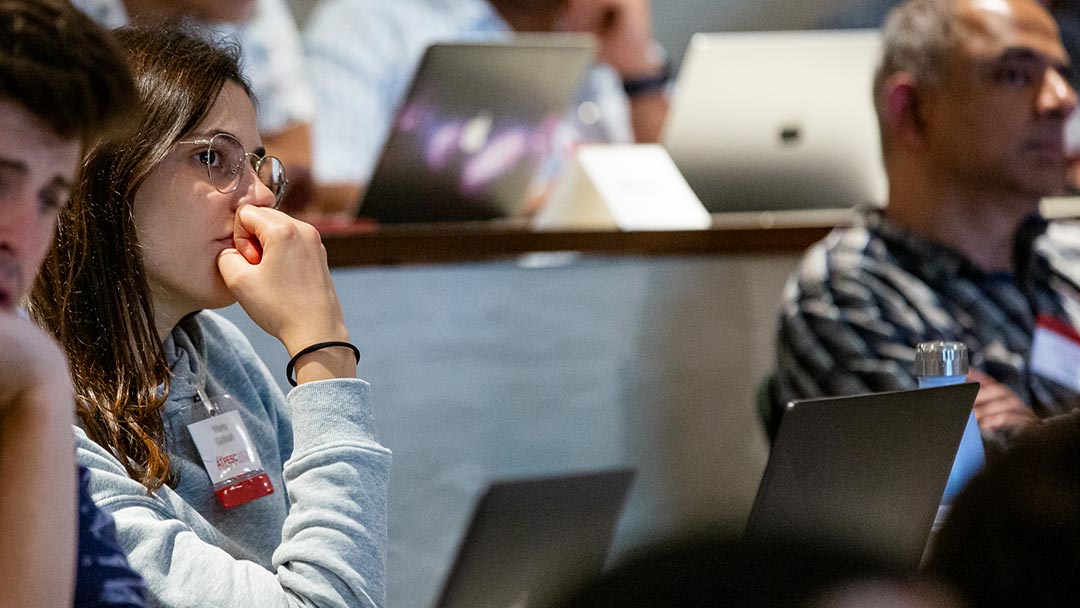Computing Conferences and Events
ALCF researchers regularly contribute to some of the world’s leading computing conferences and events to share their latest advances in areas ranging from computational science and AI to HPC software and exascale technologies. In 2023, Argonne staff participated in a wide range of events including SC23, ISC High Performance, Grace Hopper Celebration, SIAM Conference on Computational Science and Engineering, Richard Tapia Celebration of Diversity in Computing Conference, IEEE International Parallel & Distributed Processing Symposium, International Conference on Parallel Processing, International Symposium on Cluster, Cloud and Grid Computing, International Workshop on OpenCL and SYCL, Platform for Advanced Scientific Computing Conference, HPC User Forum, Energy High-Performance Computing Conference, Lustre User Group Conference, Intel eXtreme Performance Users Group Conference, Conference on Machine Learning and Systems, and more.
Exascale Computing Project
DOE’s Exascale Computing Project (ECP) is a multi-lab initiative to accelerate the delivery of a capable exascale computing ecosystem. Launched in 2016, the ECP’s mission is to pave the way for deploying the nation’s first exascale systems by building an ecosystem encompassing applications, system software, hardware technologies, architectures, and workforce development. Researchers from the ALCF and across Argonne—one of the six ECP core labs—are helping the project achieve its ambitious goals. The laboratory has a strong presence on the ECP leadership team. It has several researchers engaged in ECP projects and working groups focused on application development, software development, and hardware technology. In the workforce development space, the ALCF is highly involved in the DOE Exascale Computing Project’s Broadening Participation Initiative and leads the Intro to HPC thrust. Additionally, the ECP provided funds for the annual Argonne Training Program on Extreme-Scale Computing (ATPESC), organized and managed by ALCF staff.
HPC Standards and Community Groups
ALCF staff members remain actively involved in several HPC standards and community groups that help drive improvements in the usability and efficiency of scientific computing tools, technologies, and applications. Staff activities include contributions to the Better Scientific Software, C++ Standards Committee, Cray User Group, DAOS Foundation, Energy Efficient High-Performance Computing, HPC User Forum, HPSF High-Performance Software Foundation, Intel eXtreme Performance Users Group, Khronos OpenCL and SYCL Working Groups, LDMS User Group, UXL Foundation, MLCommons (HPC, Science, and Storage Working Groups), NITRD Middleware and Grid Infrastructure Team, OCHAMI, Open Fabrics Alliance, OpenMP Architecture Review Board, OpenMP Language Committee, OSTI ORCiD Consortium Membership, Open Scalable File Systems (OpenSFS) Board, and SPEC High-Performance Group.
Performance Portability
The ALCF continued its collaboration with NERSC and OLCF to operate and maintain a website dedicated to enabling performance portability across the DOE Office of Science HPC facilities. The website serves as a documentation hub and guide for applications teams targeting systems at multiple computing facilities. The DOE computing facilities staff also collaborate on various projects and training events to maximize the portability of scientific applications on diverse supercomputer architectures.
Vendor Collaborations
The ALCF works closely with many companies in the HPC and AI industries to develop and deploy cutting-edge hardware and software for the research community. This includes collaborating with Intel and HPE to deliver the Aurora exascale system, working with HPE to deploy the Polaris testbed supercomputer, and partnering with NVIDIA on system enhancements and training related to ThetaGPU. Such partnerships are critical to ensuring the facility’s supercomputing resources meet the requirements of the scientific computing community. In addition, the ALCF is working with several AI start-up companies, including Cerebras, Graphcore, Groq, and SambaNova, to deploy a diverse set of AI accelerators as part of the ALCF AI Testbed. The testbed, which opened up to the broader research community in 2022, is playing a key role in determining how AI accelerators can be applied to scientific research, while also allowing vendors to prepare their software and hardware for scientific AI workloads.
